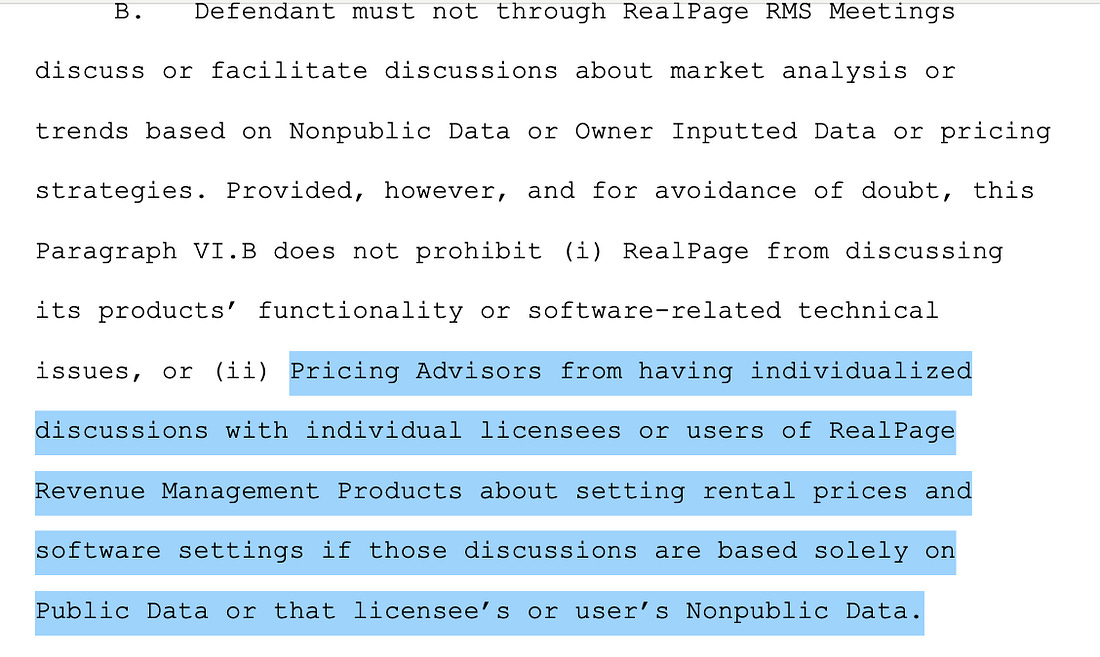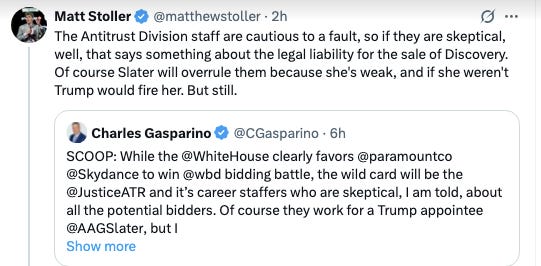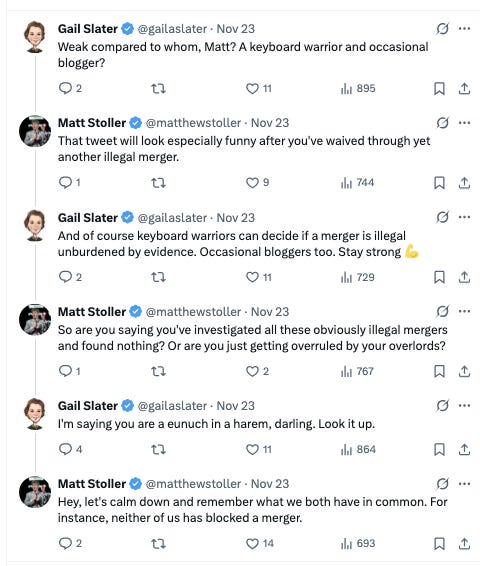The Rent Is Too Damn High: Did Trump Just 'Bless' Using AI to Jack Up Rents?Trump Antitrust chief Gail Slater ended the DOJ's big antitrust case against alleged software rent-fixing conspirator RealPage. The company's lawyer says the DOJ has now 'blessed' their product.In September, renters dealing with affordability challenges started getting some actual good news - price drops. “National average rent fell 0.3% from August,” reported the Wall Street Journal, “the steepest September drop in more than 15 years, according to data firm CoStar.” It was an unexpected decline. Why? While there was a lot of multi-family apartment building the past few years as rents increased, the construction boom had tapered off, and big landlords thought the rent hikes could resume. Only, as the WSJ noted, this “glut of new units is taking longer to absorb than expected.” One driver of lower rents that went unmentioned is that a main focal point for pricing rental units - the data sharing software and consulting firm RealPage - has undergone a legal assault for years. In October of 2022, during the post-Covid inflationary moment, Heather Vogell published an investigative piece at Propublica on how one corporation was using algorithms to help giant landlords collude. Median rents in some cities went up 18% in the spring of 2022, and the whole industry was talking about the giant price spike. Vogell reported a remarkable comment from one executive about RealPage’s role in the rental increases: “I think it’s driving it, quite honestly.” Here’s how the alleged conspiracy worked. RealPage, which is owned by powerful private equity fund Thoma Bravo, allegedly shared sensitive rental and occupancy information across its clients, who are big corporate landlords. It then worked with them to raise rents and keep additional units off the market through a variety of tactics. For instance, RealPage software automatically recommended higher rents to clients. It also made it difficult for landlord employees to lower rents or give concessions, and it had pricing advisors who organized meetings for landlords to exchange information. As the architect of RealPage once explained about the value of the software and why landlords should be charging more and have more empty units, “[i]f you have idiots undervaluing, it costs the whole system.” The story created an uproar, including lawsuits from Arizona and D.C. and reactions from local and Federal lawmakers. Multiple states and cities have now passed bills banning the kind of algorithmic price-fixing fostered by RealPage. In August of 2024, the Department of Justice Antitrust Division, as well as nine states (CA, CO, CT, IL, MA, MN, NC, OR, TN) filed a monopolization and price-fixing lawsuit. The complaint even had price-fixing clip-art! Now, there are a few reasons why this lawsuit mattered. The first is that, if the conspiracy were broken up, the normal supply and demand dynamics could start to resume, and landlords would compete for renters with lower rents and extra inducements. That seems to have started to happen. The second is perhaps more important; algorithmic price-fixing and all sorts of new forms of data sharing are now pervasive across the economy in industries as varied as pvc pipe to hotel rooms, and the law here is not well-defined. The RealPage case was a great way to clarify the law and end some of the practices that are likely driving up prices across the board. So this case could be a great test for Trump’s focus on affordability. On the other hand, Thoma Bravo, the private equity fund that owns RealPage, hired well-connected lobbyists Ballard Partners, where Pam Bondi and a bunch of Trumpers used to work. So we know what happened next… Settling WeaklyYesterday, Trump Antitrust Division chief, Gail Slater, announced that the Antitrust Division was settling the lawsuit with RealPage, claiming a “big win for renters and families!” Here’s Slater’s video explaining the settlement, signing off with “Happy thanksgiving to all, even the haters.” Slater describes the settlement as (1) prohibiting RealPage from sharing private data among its customers (2) limiting the geographic scope of its analytical tools so that landlords can’t get granular data to increase rents as easily and (3) eliminating the features that automated the increases of rent. These provisions, she said, would help bring down rents, and stop the illegal conspiracy. The DOJ included proposed settlement text, and competitive impact assessment. That’s fine as far as it went. But there were a few unusual things about the announcement. First, RealPage’s attorney, Gibson Dunn’s Stephen Weissman, had his own version of events, claiming that the Antitrust Division had come to “bless the legality of RealPage’s prior and planned product changes” and expressing gratitude for the government. “There has been a great deal of misinformation about how RealPage’s software works and the value it provides for both housing providers and renters,” he added. That’s a shocking quote, RealPage’s takeaway that the DOJ blessed the company’s earlier conduct. Second, for such a “big win” on affordability, releasing the information a few days before Thanksgiving is… well that’s where you hide bad news. Maybe the Antitrust Division is just bad at press relations, but the timing is odd. Third, nine states who were co-plaintiffs with the Antitrust Division did not sign on to the settlement, which means they did not trust or agree with the DOJ. And fourth, well, I’ll get to it later, because it has to do with Slater lashing out on X at me the night before. What Does This Settlement Actually Do?So what does this deal actually mean? Well, some of the most obviously bad RealPage activity is now barred, such as overt sharing of non-public information among landlords (though “non-public” is actually a pretty small set of competitively sensitive information). Pricing advisors and default rent increase features similarly have new restrictions. And there’s an independent monitor. But there is a reason that RealPage’s counsel is so positive about the settlement. The settlement is a set of “complex behavioral remedies” that have such a poor track record of being enforced. And they feel full of loopholes that will allow the company to approximate much of the earlier behavior. For instance, there are lots of different rules on “synthetic curves,” “unaffiliated property data,” “surrogate data,” exceptions of exceptions, and much of the terminology does not match up with the original complaint. If I were a defense lawyer trying to insert loopholes into a settlement, this kind of document is what I’d propose. Take, for instance, the “synthetic curves,” mentioned previously which is essentially a list of prices that RealPage offers to help landlords set rents. The settlement says RealPage can’t offer the same synthetic curve to different clients, which would be a form of price-fixing. But it doesn’t say that RealPage can’t offer a similar synthetic curve to different clients. If RealPage slightly tweaks the list of prices, or uses last week’s curve, then that seems fine. Or maybe it’s not, it’s a gray area. Which means detecting a violation would be so difficult, and then complaining to a judge about such a violation would also be time-consuming. RealPage knows this agreement won’t be policed vigorously. Another example, which I think is easier to understand, is that RealPage gets to keep its pricing advisors that tell landlords what to charge. The change is those advisors are not allowed to have broader meetings, but they are still allowed to have one-on-one conversations with landlords as long as those conversations are based on public data. Here’s the text. I find this to be an odd choice. How is a pricing advisor supposed to have a discussion solely based on public data or the client’s data? If a client says “what do you think about raising rents here” and that pricing advisor just talked to a different landlord who is raising prices, what are they supposed to say? Are they supposed to delete all the info in their head? Law firms have client conflicts for exactly this reason. This settlement is *asking* to be violated. The gist of the settlement is that RealPage gets to keep the structure of the industry in place. It can keep all the old data that it gathered unlawfully and build models upon it, which means that rental markets will still be interpreted through RealPage. It can still have pricing advisors explaining to clients whether they can raise rents. Since public data can be shared, I’m guessing what’ll happen is landlords will start to share more data, which will be processed by RealPage and turned into price increases. And it’ll all be blessed by the Antitrust Division, even though the division is bleeding its most capable staff. Finally, the settlement monitor lasts for three years, which means that it ends before the Trump administration does. Ergo, there’s no chance a different more serious leader gets to enforce it if it’s violated. Now, that’s not the end of accountability for RealPage. There are still lots of lawsuits, though it’s much harder to go after a firm for monopolization and price-fixing when they already have a settlement with the DOJ. State attorneys general will have to explain to the judge why this settlement isn’t sufficient. There are also an increasing number of states and cities passing laws against algorithmic collusion on rents. So RealPage isn’t out of the woods. But it’s a big win for them. It’s also a big win for algorithmic price-fixers all over the economy, because the DOJ just telegraphed all the things they are willing to allow. And judges are going to ask “well if RealPage can do it then why can’t XYZ other data broker do it too?” Gail Slater Lashes Out At MeAnd now comes the weird part of this story. The night before this announcement, on Sunday evening, Slater was clearly feeling some tension. And here’s how I know. At the time I was doing some research on Hollywood consolidation. One dynamic at play is that staff at the Antitrust Division believe that further studio mergers are likely unlawful. In a tweet, I pointed out that this legal analysis matters, because state enforcers might be able to intervene even if the Federal government won’t. I noted that Slater is weak, but purely to make the point that she won’t block the merger and so we’ll never publicly learn that internal DOJ staff are skeptical. I didn’t think much of it. But a few minutes later, Slater herself responded with a random insult. It’s an odd thing for her to do; Slater isn’t like most Trump nominees, she got 87 Senate votes and was respected by Democrats and Republicans. She likes to think of herself as collegial and bipartisan. I don’t know her well, but the two of us have always been cordial. But she’s also contorting herself to be more MAGA, coming up with attempts at memes to make herself more Trump-y. There are few rules of decorum anymore. So the two of us had a back-and-forth, in which I pushed her to block a single merger, while Slater mocked me for being a “keyboard warrior,” an “occasional blogger,” and a “eunuch” for some reason. Here’s the full weird thread. I thought it was strange. But then the next day came this RealPage settlement. So she probably was feeling some tension. I find Slater’s approach to be sad. Back in December when she was nominated, she made a big deal of being a new kind of conservative, even breaking out a popular internet meme in her confirmation hearing that Tyranny.com could be as big a threat as Tyranny.gov. And I had some hopes for her, because populists on both sides of the aisle had vouched for her. She kept her cards close to her chest, so I didn’t know exactly what she’d do. But now we have a track record, and it’s not good. I am still cheering for her. I want her to do well because I want Americans to do well. That said, what Trump enforcers do, or don’t do, matters less and less every day, and not just because most policy is run out of the White House. It’s All GoodI wish the Federal RealPage antitrust case had gone to trial with DOJ in the driver’s seat. And it’s quite possible the states keep it going. As the Biden antitrust actions get further in the rearview mirror, we can see more clearly that it was the sketch of something powerful and meaningful. But it was just a sketch. We always needed more, and lot more. We needed the American people to have voted for that agenda, and though it was well-liked, we didn’t quite have that. But Trump has done us a favor. We are in a political moment, where state lawmakers and candidates have to get authorization from the American public through elections to address oligarchy and the affordability crisis it is engendering. Today, Americans dislike and distrust AI. According to Edelman, a majority of Americans agree with the statement “People like me will be left behind rather than realize any real advantages from generative AI.” And they are right, as we’re seeing with this RealPage situation. An algorithm in the hands of an oligarch isn’t a friend. By endorsing Federal government inaction against price-fixing by algorithm, the noxious mixture of private equity and corporate landlords driving up rents, Trump has pushed our argument forward. Even the New York Times editorial board is now writing about Trump’s bad behavior on antitrust, corrupt media mergers, and the Robinson-Patman Act. That’s a big change, I don’t think that would have been likely five years ago. Pretty soon, we’ll have an election, and then another. And the result will be the same as it’s been for 20 years, a “throw the bums” out wave. The question is, what will the next set of bums do? And with, Happy Thanksgiving to all, even to Gail Slater. Thanks for reading! Your tips make this newsletter what it is, so please send me tips on weird monopolies, stories I’ve missed, or other thoughts. And if you liked this issue of BIG, you can sign up here for more issues, a newsletter on how to restore fair commerce, innovation, and democracy. Consider becoming a paying subscriber to support this work, or if you are a paying subscriber, giving a gift subscription to a friend, colleague, or family member. If you really liked it, read my book, Goliath: The 100-Year War Between Monopoly Power and Democracy. cheers, Matt Stoller This is a free post of BIG by Matt Stoller. If you liked it, please sign up to support this newsletter so I can do in-depth writing that holds power to account. |





